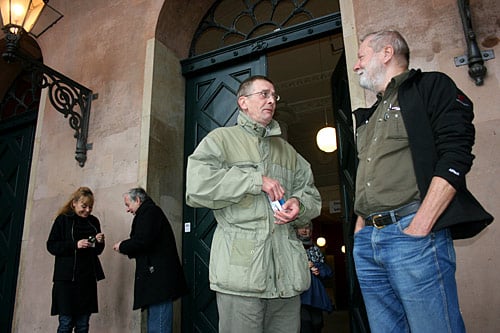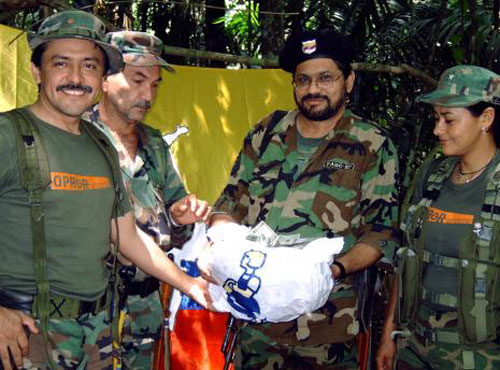The Popular Front for the Liberation of Palestine salutes the efforts of the Danish comrades in Opror (Rebellion) and Fighters + Lovers to challenge so-called “anti-terror” laws and defend the right to support national liberation movements. We salute Patrick Mac Manus and all those who struggle around the world in solidarity with the cause of the Palestinian people and all oppressed peoples and call upon all to emulate this example of courageous defiance and solidarity in the face of injustice and oppression.
The following article was published on March 16, 2010 in Dissident Voice, by independent journalist Ron Ridenour:
Patrick Mac Manus on the way to the City Court on 3 December 2009. Photo by Svend Espensen, ArbejderenDenmark’s Rebellion (Oprør) spokesman Patrick Mac Manus was found guilty today (March 15, 2010) in Copenhagen City Court for: “attempting to collect funds” for “terrorist organizations” Revolutionary Armed Forces of Colombia (FARC) and Popular Front for the Liberation of Palestine (PFLP); and for “encouraging [hundreds of organizations] to collect funds” for the same.
Judge Helle Hastrup, however, rendered a mild sentence of six months probation as opposed to 18 months imprisonment asked for by the prosecutor. Court costs of 110,000 Danish kroner (about $20,000) plus 25% tax are to be shared by the defendant and the state. She could have demanded that all court costs be paid by the defendant.
Judge Hastrup’s decision that FARC and PFLP are terrorist organizations was based exclusively on Denmark’s Supreme Court decision one year ago in a similar case against Fighters & Lovers. Those seven solidarity activists had sold t-shirts with FARC and PFLP logos with the objective of sending part of the proceeds to media projects on their behalf. The political police (PET) confiscated all funds and arrested them for supporting terrorism. In 2007, Copenhagen city court found them innocent because it determined that the liberation fighters in Colombia and Palestine were not terrorists. Nevertheless, in 2008, a higher court reversed this decision — finding the liberation groups to be terrorists — and sentenced the activists to jail terms of two to six months. On March 25, 2009, the Supreme Court confirmed the judgment but found the terrorist law 114 to be “unclear” and reduced the sentence to probation.
Judge Hastrup’s verdict was supported by one of the two lay judges while the other did not find sufficient evidence that Mac Manus was guilty as charged.
Although the 700-member Rebellion group has several spokespersons, the police only charged 65 year-old, Irish-born Mac Manus. The city court found him to be the key person, although it admitted that the prosecution had not proven that any funds were actually transferred to the “terrorist organizations.” Rather the judgment was based on what Rebellion’s website purported — that it had collected and sent funds — and on 2000 emails on Mac Manus’ computer confiscated by the police following his arrest.
During the four-day trial, lasting over several months, the prosecutor, Jakob Buch-Jepsen, admitted that the police had no hard evidence but rested his case on Mac Manus’ own admission that he had donated $4 (20 kroner) at a Rebellion party in August 2004. The prosecutor also read excerpts from wiretapped telephone conversations and from the confiscated emails indicating that Mac Manus was a spokesperson and that he wrote press releases and articles favoring struggles for liberation from the occupation forces of Israel and the repressive governments of Colombia.
“Evidence”: A Satirical PhotoDefense attorney Thorkild Hoeyer argued for a finding of innocence based on the fact that the state had no hard evidence of crimes committed by Mac Manus; that the state had no evidence that FARC and PFLP are, in fact, terrorist organizations as defined by international law; that any appeals to collect funds for said organizations were not directed in favor of supporting terror but rather liberation from terror; and that the defendant acted and spoke in satire, challenging the anti-terror law to a public debate, a la Jonathan Swift.
Judge Hastrup disregarded the argument of satire and held with the Supreme Court’s 2009 ruling — regardless of terrorism or other international crimes Israeli and Colombian governments might commit against their own citizens or against the occupied people of Palestine this is irrelevant to Danish anti-terror laws. If non-government liberation organizations commit acts which result in the death of civilians, then the groups are terrorists by definition of Danish laws from 2002. This places Denmark above United Nations conventions, which judge armed struggles in the context of actual conditions, as Mac Manus wrote in his “9 Theses: The Right to Rebellion”:
“The American Declaration of Independence was written by insurgents against British colonial power in 1776, a declaration of ‘unalienable rights’ — among these the rights ‘to Life, Liberty, and the Pursuit of Happiness.’ And the right to resistance against every regime that violates these rights: ‘whenever any Form of Government becomes destructive of these Ends, it is the Right of the People to alter or to abolish it. . . .’
“The Universal Declaration of Human Rights, adopted after World War 11, accentuates: ‘Whereas it is essential, if man is not to be compelled to have recourse, as a last resort, to rebellion against tyranny and oppression, that human rights should be protected by the rule of law.’
“The supplemental protocol of the Geneva Convention, in 1977, legalizes ‘armed conflicts’ when people are ‘fighting against colonial domination and alien occupation and against racist regimes in the exercise of their right of self-determination.'”
“These are declarations created through a hard-won history, which Rebellion (Denmark) determinedly will defend.”
Amidst a flurry of flapping union and Horseroed-Stutthof WW11 resistance fighters’ banners, and shouts from scores of supporters outside the court, Mac Manus responded to the court decision.
“This won’t stop me or us. We will continue to seek an end to these terror laws, to their terror wars. Our struggle is worth it regardless of court judgments. We act in the long history of solidarity, supporting those who fight for liberation and self-determination.”
Neither Mac Manus nor Hoeyer could immediately state if they will appeal the decision but chances of winning are less than slim and, as Mac Manus, stated:
“It is not the place of Danish courts to judge the veracity of struggle for liberation in foreign lands, such as Colombia and Palestine. They are incompetent.”
Hoeyer commented on the courts’ admission of “lack of clarity” in Danish anti-terror laws.
“This should mean that the accused in both cases [Rebellion and Fighters & Lovers] should be acquitted. If there is doubt then guilt can not be established. But unlike in United States jurisprudence, this point is vague in Danish law. Civil liberties are not as clear cut here.”
Prosecutor Jakob Buch-Jepsen skirted around the crowd of freedom activists, walking alone just as he had earlier entered the courtroom filled with humans united in solidarity.
This statement was first published on the PFLP Web site; it is reproduced here for non-profit educational purposes.
|
| Print


